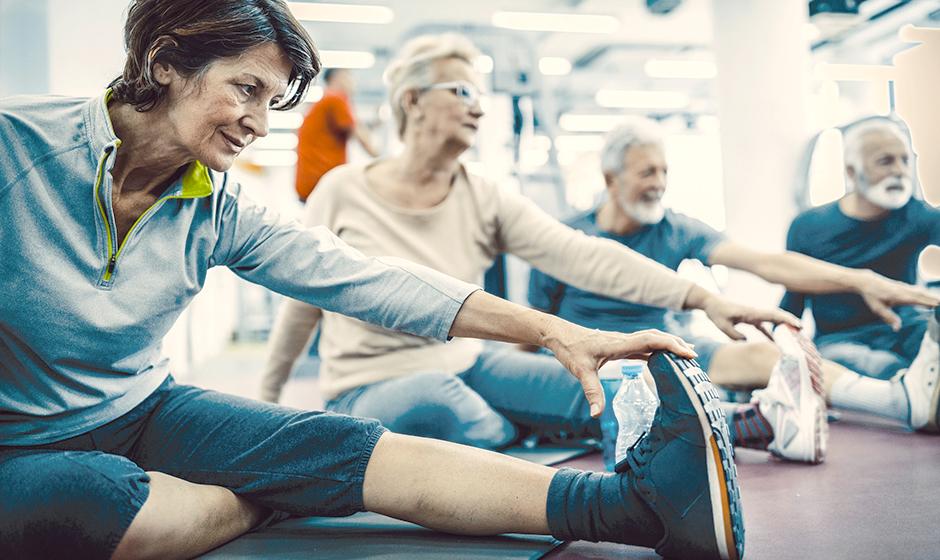
Novel stimulus technique measures muscle sensory receptor reflex speed.
When the human body is sensing its movement, location and positioning, also known as proprioception, many neural systems are hard at work. Researcher Dr. Robyn Mildren has a keen appreciation for these systems and how their changes due to aging can lead to mobility issues and falls, particularly for older adults.
In a paper published in the Journal of Physiology, Mildren and Vancouver Coastal Health Research Institute scientists Dr. Tim Inglis and Dr. Mark Carpenter, as well as University of British Columbia researchers Dr. Jean-Sebastien Blouin, Margot Schmidt and Gregg Eschelmuller, examined how aging influences muscle sensory receptors called spindles that are encapsulated within muscles. Muscle spindles detect a muscle’s length, how quickly it is stretching, and are activated by movement and tendon vibrations of different frequencies. Many different activities, such as walking, jumping or running, stimulate muscle spindles at different frequencies, and in turn this stimulation of spindles contributes to muscle activity via rapid reflexes and also tells our brain about how we are moving.

“If you were swaying forward at the ankle joint, for example, the calf muscle would be stretching, which would activate those spindles to send signals to the spinal cord and the brain to generate compensatory reflexes to help prevent you from falling forward,” explains Mildren, whose current post-doctoral work focuses on how the cerebellum processes inner ear information during voluntary movement and perturbations. “Spindles are just one part of the many feedback loops that help with the body’s proprioception and control of balance.”
“We wanted to study the proprioceptive feedback that comes largely from these muscle spindle receptors because this particular system is very important for the control of balance and movement.”
Muscle spindles in animals have been shown to change their firing behaviour and responses to stimuli with age. However, these behaviours and responses are very difficult to study in humans.
To address this challenge, Mildren and her co-researchers developed a novel technique for their study that allowed them to stimulate spindles in the soleus muscle found in the calf. Using a programmed motor, they applied a range of stimulation frequencies to the soleus muscles of 54 healthy study participants, between the ages of 20 and 82, as they stood upright. The researchers sought to measure how strongly those frequencies they delivered to the spindles travelled through the reflex pathway to reflexively activate the muscle, to appear in the ongoing electrical activity they recorded.
“Many techniques that try to assess human reflexes in standing can cause small disturbances to one’s balance control,” explains co-author Dr. Inglis, who is an associate member at ICORD and a professor in the School of Kinesiology at the University of British Columbia.

The researchers found that there was a fairly gradual decline with age in the strength and the frequency bandwidth of reflex responses that are mediated by muscle spindles.
“The muscle response relative to the stimulus decreased with age,” says Mildren. “Essentially, older adult participants did not have reflexes across as large a bandwidth as their younger counterparts.”
“The study highlighted that these sensory systems are changing across the lifespan, and the nervous system and the brain are able to adapt, to some extent, to these changes,” Mildren explains. “However, it’s important to consider pre-habilitation maybe even earlier, in middle age, in terms of proprioceptive training and exercises that focus on strength, balance and joint stability.”
An aging population requires more research on proprioception
Previous research that looked at muscle spindle biopsies showed that there is a linear change in spindles across the lifespan.
“This provides some clues that the changes we’re seeing are driven by these morphological or structural changes in the muscle spindles rather than at other places along the pathway,” says Mildren. “We were able to infer this because we chose a large age range among participants not only to see how these sensory systems change across the lifespan, but to also give us clues about what kind of mechanisms are underlying age-related changes.”

Dr. Inglis adds that being able to study how these reflexes are altered in other neurological conditions could also be useful.
“This can especially be useful when assessing patients following a stroke, those with Parkinson’s disease, or even tracking how the reflex changes over time in early onset neuropathies like those associated with diabetes.”
“Understanding what these muscles specifically do, how they change with aging, and the functional implications of these changes for balance are critical areas of research,” says Mildren. “These types of discoveries can positively impact the lives of older adults and their families, who want them to be as healthy and safe for as long as possible.”


